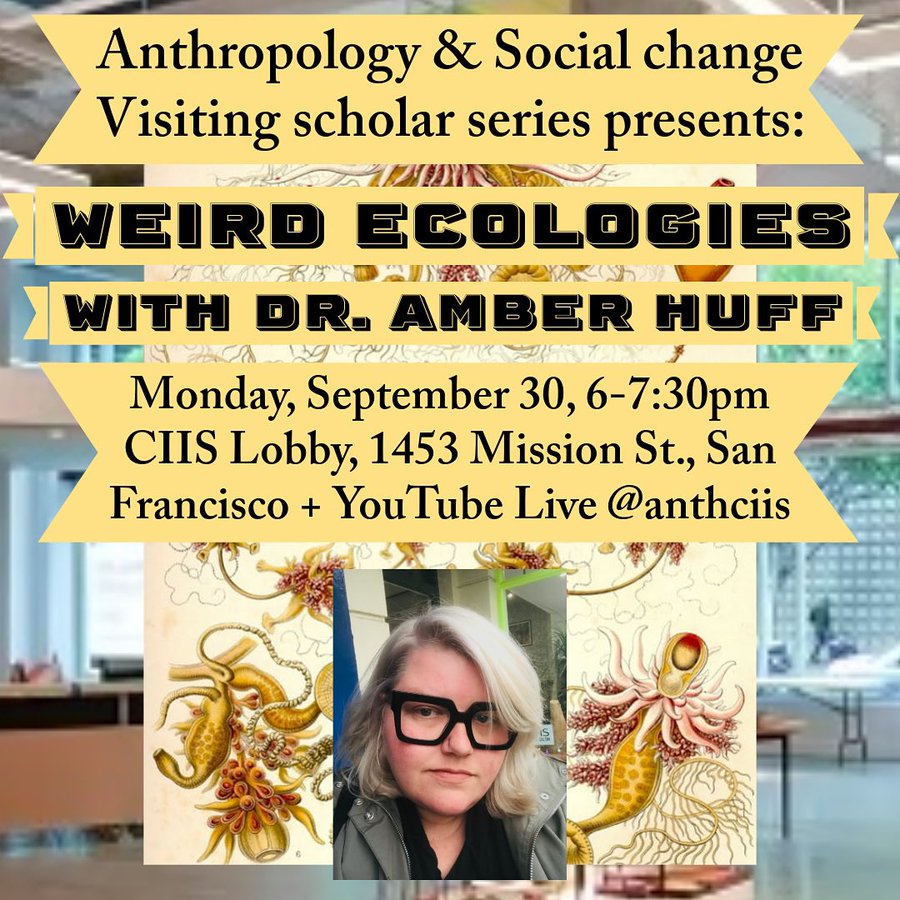Watch the video of two talks given by Amber Huff at the California Institute of Integral Studies (CIIS) in September/October 2024.
The talks were given in a Visiting Scholar series hosted by the Department of Anthropology & Social Change at CIIS.
Weird Ecologies
About this talk
In art, film, and fiction, the Weird typically enters as a sensation of disorientation or imminence, the breaching of boundaries and worlds becoming entangled. In the weird tale, the monsters and aliens are not from another planet, but are from another reality system, uncanny incursions that disrupt or unsettle ordinary perceptions of time, space, ecology, causality and agency and blur distinctions between the ‘real’ and the hallucinatory. Materialities of the Weird are often transgressive, expressed as imaginative ecologies that play with scientific taxonomies and binaries, states of matter, and normative distinctions between human and other.
This talk uses ‘the Weird’ as an epistemic entry-point for understanding relationships between affective experience and the emergent political terrain of the ‘Anthropocene’. Specifically, we use ‘weird ecologies’ as a lens for describing spaces of affective encounter with ecological difference as well as method, for exploring, learning and telling stories about these spaces and encounters. Focusing on Sea Change, a group of divers and filmmakers who explore multispecies relationships in the Great African Kelp Forest, we analyze how their storytelling, seen in the film My Octopus Teacher, makes the strange familiar. Analysis of public responses to their storytelling reveal a range of reactions, including reports of new feelings of intimacy and kinship with the earthly strange or ‘alien’, ambivalent critique, as well as strong negative and reactionary responses, including revulsion and accusations of bestiality.
If the Weird is ultimately about breaching boundaries, encountering difference and the inevitability of change, then asking how we respond to earthly encounters with difference, and how these encounters might change us and the stories we tell about people’s place in nature, are important questions for understanding and shaping politics at the current juncture.
Commons, Enclosure and Value Struggle
About this talk
Commons, enclosure and value have long been key reference points for anthropologists, critical socio-environmental researchers, and people’s struggles, but the geography, politics, technological and environmental dimensions of both resource struggle and social action are evolving in ways that stretch classic concepts and unsettle and challenge well-established frameworks that can be blind to situated experience, practice and politics. How can our understanding of the global terrain of social action be extended and deepened by re-thinking ‘the commons’ relationally, not just as an institutional form, material resource or property relation, but as constituted through and emergent from struggle?
This talk argues that ‘commons’ should be understood as a plural and multidimensional framework for thinking about self-organised, situated processes and productive politics of collective striving, as well as a means of plotting and enacting alternatives to crisis-laden value relations favoured by the state and capital, whilst imagining and cultivating the social, technological and ecological relationships, plural values and infrastructures for new orders.
